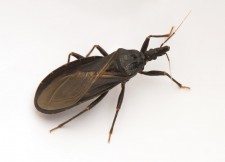While the Zika virus captivates the United States and many audiences around the world, another disease is creeping behind the curtains and across our southern border: Chagas disease.
The parasitic disease resides mostly in South America, yet it has established a foothold in the southwestern U.S. The Pan American Health Organization estimates that there are about eight million infected Latin Americans, while the CDC estimates about 300,000 are infected in this country.
Chagas disease symptoms range widely. First there's fever, vomiting and diarrhea. Then enlarged livers and swollen lymph nodes. And, in some cases, it can result in heart failure and cardiac arrest.
The average human case comes from an infected "kissing bug" bite. Kissing bugs are known to attack at night, biting their victims around the eyes and mouth while they sleep. It then spits its feces into the sleeping victim's skin. The Chagas trademark is something known as Romana's sign, where the victim's eyelids swell on the bitten, or feces-infected, side of the face.
Studies now show that infected mothers can also pass it to their newborn children through the placenta. This is doubly bad news, given that Chagas symptoms are more pronounced in those with weaker immune systems.
"Congenital transmission will be the predominant way that kids in the United States get these diseases," Christine Petersen, study author and associate professor of epidemiology at the University of Iowa College of Public Health, tells the University of Iowa.
Texas has seen a significant jump in the number of Chagas cases in the last few years. Over half of Texas kissing bugs are infected with the parasite. Also, infected Texan dogs and rats could pass the parasite along to uninfected bugs. A recent study identifies increased infection risk in Texan hunters, because of the bugs' abundance in common hunting grounds.
It's gotten so bad that the Texas Legislature passed a bill in 2015 requiring its Department of State Health Services to establish oversight for a group of surging and overlooked tropical diseases that includes Chagas. While 28 other states have native kissing bug populations, Texas remains one of the only states to set measures against the disease.



